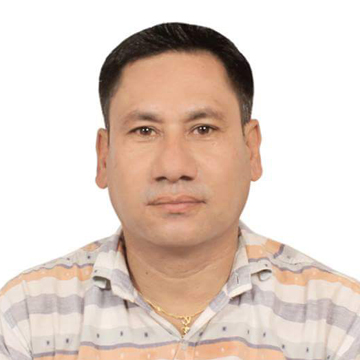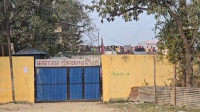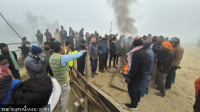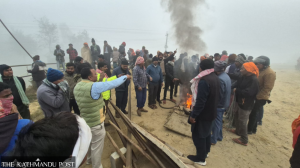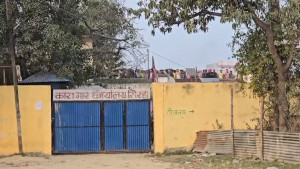Madhesh Province
Musahar children in Rautahat deprived of formal education and state benefits
Musahar children are deprived of birth and citizenship certificates due to the apathy of local government, guardians say.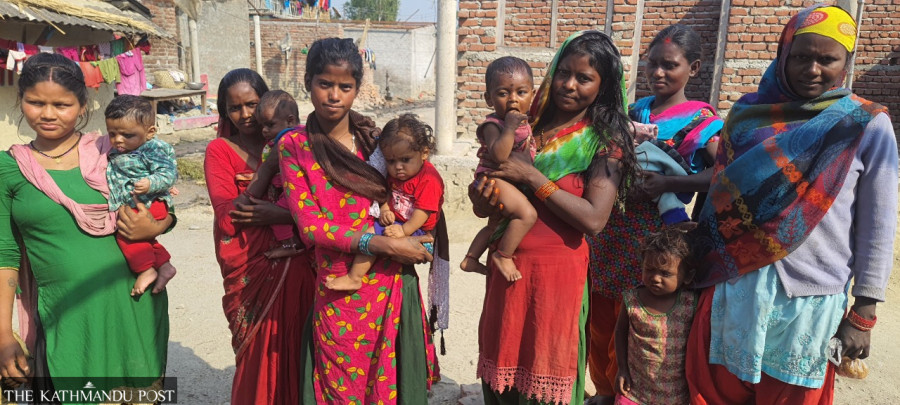
Shiva Puri
Kabita Majhi, a 24-year-old woman of Dumariya, a Musahar settlement in Chandrapur Municipality-9, has four daughters. All four of her daughters are deprived of education and government facilities since their births have not been registered at the ward office.
Majhi does not have a citizenship certificate therefore she couldn’t register the births of her children, she says.
According to the existing legal provisions, the guardians have to furnish their children’s birth certificates while seeking admission at a school.
Without a birth certificate, Majhi’s children are deprived not only of formal education but also of all child welfare schemes allowed by the government.
“My daughters, who are between the ages of four and nine, haven’t been able to go to school because they don’t have a birth certificate,” said Majhi. “I can’t even collect the nutrition allowance from the local level for my youngest one as her birth is not registered.”
The government in 2017 had announced a nutrition allowance programme for children under the age of five in Rautahat, Bajhang and Achham districts. Before that, only Dalit children were provided with the monthly nutrition allowance of Rs 400.
But in Rautahat, a majority of children from the impoverished Musahar community do not have access to such government programmes.
“I don’t have a citizenship card and both of my parents are dead. In a situation like this, the ward office should help people like us,” said Majhi. “I have tried every possible way to get birth certificates for my children but failed to do so.”
Majhi tried to enroll her daughters of school-going age to Dumariya Secondary School near the Musahar settlement but the school denied them admission in the absence of birth certificates.
Manoj Musahar, another local, said there are around 50 children in Dumariya without birth certificates.
“There are more Musahar children in other local units of the district who don’t have birth certificates,” said Manoj.
According to Keshab Basnet, ward secretary of Chandrapur, the citizenship and marriage certificates of the parents are needed to apply for a birth certificate at the local level.
“Guardians can register the birth of a child within 35 days of birth for free. After 35 days, they can still register the birth but will be charged Rs 200. The municipality has also been providing a nutrition allowance of Rs 500 per month for children under the age of five,” he said. “To register a child’s birth, parents must furnish their citizenship, but if they don’t have the document, they must come to the ward office.”
“In most cases, parents come to the ward office and leave when they find out that they need their citizenship certificate to register the birth of their child,” Govinda Dulal, chairman of ward-9, told the Post. “If they have issues, they can talk to us. I will now take the initiative of providing birth certificates to Musahar children.”
The government’s programme provides nutrition allowance to up to two children born to a couple. It is estimated that around 500 children of Musahar and Dom communities in Rautahat have not been able to get the allowance.
Anup Majhi, a resident of Gajura Municipality-5, said that Musahar children are deprived of their birth and citizenship certificates due to the apathy of the local level government.
“Authorities in the ward office have to look into these issues on a case-by-case basis. Many Musahar families do not have citizenship certificates and we have been deprived of government services and opportunities our entire lives because of that,” said Anup. “Our children should not go through the same miseries. They are already deprived of state facilities and education. They will be left behind if this disparity continues.”
According to a recent report released by Madhes’s Policy Commission, Rautahat is multi-dimensionally the poorest and least literate district in Madhes Province. The province has an economic poverty index of 27.7 percent.




 18.12°C Kathmandu
18.12°C Kathmandu